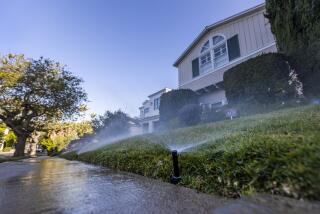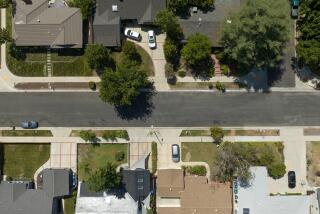Saving Water Now May Avoid Emergency
- Share via
Officials of the Los Angeles Department of Water and Power, the Metropolitan Water District and the California Department of Water Resources agree that the summer of 1987 will not bring a water emergency.
But there is a broad consensus that because water demand and supply in the West is a fragile balance, at best, consumers should conserve water this year in any way they can.
“It would be a good idea to conserve now,” said Jerry Beard, snow survey supervisor for the U.S. Department of Agriculture regional office in Boise that tracks water supply trends in portions of five Western states. “We don’t know what’s coming down the road another year. If we go into another dry season next year, we’ll have some serious problems.”
Agencies polled by The Times agreed that consumers can take these steps this summer:
- When watering lawns and residential landscaping, water early in the evening to avoid evaporation in the heat of the day.
- Water thoroughly and infrequently rather than often but superficially.
- Find out what type of soil is on your property since optimally effective watering techniques vary between sandy soils and those that have greater clay content.
- Whenever possible, switch to plant species that require the least amount of water to survive.
- Conduct a thorough inspection of your home or apartment, looking for leaks. Repair leaks on your property promptly. Notify the appropriate water agency of any leaks you observe in supply pipes.
- Install flow-restricting faucets and shower heads wherever possible. Conservation-designed fixtures generally provide water pressure that feels comparable to conventional fittings.
- Reset the flush mechanisms on toilets so each one uses as little water as possible. Placing bricks or other capacity-reducing devices inside the toilet tank can further cut water consumption. Avoid unnecessary flushing.
- Do not let the water run while shaving or brushing your teeth.
- If you own a dishwasher, do not operate it with less than a full load. Select appropriate water capacity settings on clothes washers, avoiding doing small loads with a full allotment of water.
- Don’t tarry in the shower. Reduce bathing times as much as possible. Best of all, take a bath, not a shower.
- Don’t clean vegetables in running water and, if you don’t have a dishwasher, don’t run water to rinse dishes. Use a second sink filled with rinse water if you have one.
- Don’t hose down your driveway or sidewalks.
More to Read
Sign up for Essential California
The most important California stories and recommendations in your inbox every morning.
You may occasionally receive promotional content from the Los Angeles Times.










